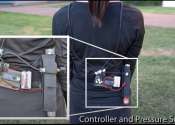A lightweight wearable device helps users navigate with a tap on the wrist
Scientists at Rice University in Houston, Texas have developed a fabric-based wearable device that "taps" a user's wrist with pressurized air, silently helping them navigate to their destination. The study, published August ...
Aug 29, 2023
0
73









